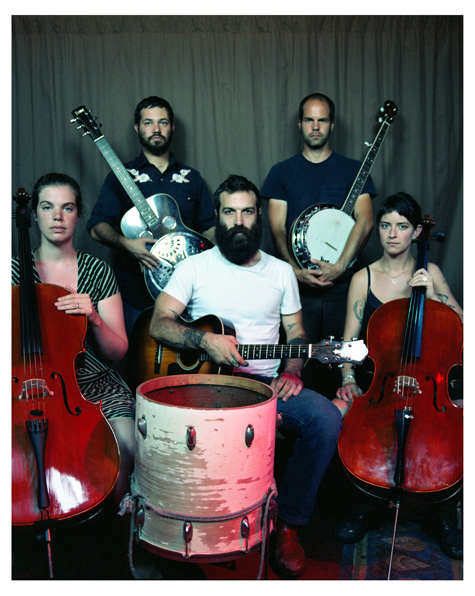
SO VERY SERIOUS Brown Bird’s new disc is actually their most playful. |
Since their start in the middle of the decade, Brown Bird have been one of the region's go-to chamber-folk outfits, with a couple of dark and stormy albums (2006's Tautology, 2007's Such Unrest) earning them a following in various nooks of New England (particularly Portland, Providence, and western Massachusetts, areas members of the group have called home). The release of their latest album, The Devil Dancing (Peapod Recordings), feels like both an ending and a new beginning.
As the group releases this new, expansive work — their first as a five-piece — three members of Brown Bird find themselves with the opportunity to spread their roots to Europe on a tour with the Low Anthem, as the remaining two — Jeremy and Jerusha Robinson — finally establish their side project, South China, as an independent force of its own, in the form of their Peapod debut, Washingtons. The two overlapping bands spent November touring the Northeast, and as Brown Bird looks across the pond, the Robinsons have opted to call their car their home, with no particular destination (save a tour of the mid-Atlantic states) determined as of yet.
For Brown Bird, The Devil Dancing is an invigorated step into open air. Their last collection, 2008's The Bottom of the Sea (Peapod) was effectively a solo affair for frontman David Lamb, and the album's relatively simple arrangements buckled under the weight of the singer's rich, brooding voice. Lamb can suffer from what I like to call Jenny Lewis Syndrome — like the indie-country acolyte, his voice is almost too good, betraying no ambiguity and so precisely embodying the ache his lyrics portray that his performances tend toward the manipulative and stifling — but The Devil Dancing's country and gospel inflections loosen him up. On "Needy Generator," when he sings "I put down the Bible for a lady and a bottle and I feel a lot less like a whore," it's with a wink.
The album is packed with similarly sly, salacious zingers; Brown Bird have always had a liking for bluesy tales of men who can't be saved, but they've never much explored the lighter side of sinning. On the effervescent hoedown "Bottom of the Bottle," Lamb's ingenious percussion (foot pedals that tap kickdrums and other percussion as he plays guitar) keeps a fleet pace, while MorganEve Swain and Jerusha Robinson's high and low strings take unironic flight and an ill-fated alcoholic looks for a home, "all scars and broken bones."
Most other songs, like "By the Reins," integrate these country experiments (Mike Samos contributes excellent electric and lap steel guitar punctuation throughout) with the simmering, Eastern European trappings of Brown Bird's past works: tense and mechanical time signatures, heightened by cello and Jeremy Robinson's accordion. It's on these tracks that Brown Bird's current conceit — not only their most satisfying, but their most accomplished — proves it ought to be more than a passing phase.